![]()
![]()
![]()
Use LEFT and RIGHT arrow keys to navigate between flashcards;
Use UP and DOWN arrow keys to flip the card;
H to show hint;
A reads text to speech;
65 Cards in this Set
- Front
- Back
|
How do you assess handedness and dominance? |
- Inventories
- Hand used for writing - Intracarotid Amobarbital Test (IAT) = Wada Test - Functional Neuroimaging (e.g., fMRI) |
|
|
What percent of the population is right-handed?
|
90% R-handed
|
|
|
How does the location (L vs. R) of language dominance differ depending on being L or R handed (early brain damage vs. none)?
|
No Early Brain Damage:
- 96% of R handers have speech localization on L side (most typical) - Only 70% of L handers have speech localization on L side Early Brain Damage: - Only 81% of R handers have speech localization on L side - Only 28% of L handers have speech localization on L side |
|
|
How does early brain damage affect the location of the speech dominance in the brain (R vs L hand)?
|
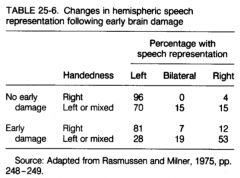
- For both (R and L handers), it decreases the percentage of those w/ speech representation in L lobe
- 96% --> 81% of R handers have speech localization on L side (most typical) - 70% --> 28% of L handers have speech localization on L side |
|
|
What side of the brain are semantic decisions made on?
|
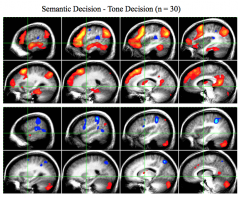
L brain --> Yellow
|
|
|
What side of the brain are tone decisions made on?
|
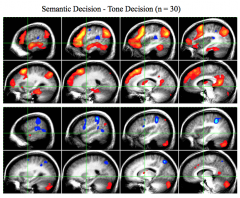
R brain --> Blue
|
|
|
In right handed subjects what is the language lateralization for normal vs epileptics?
|
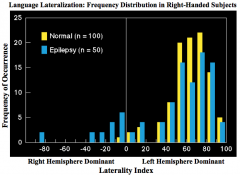
- Normal: more L hemisphere dominant (agrees with previously data)
- Epilepsy: more bilateral dominant than normal (although still emphasis on L dominant) |
|
|
How does epilepsy affect language lateralization?
|
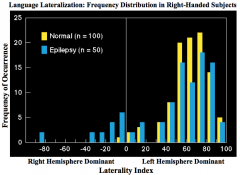
More bilateral than usual (although still mostly L dominant)
|
|
|
How does left-handedness affect language lateralization?
|
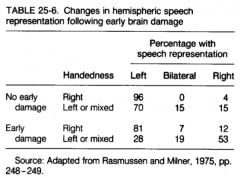
- More bilateral and right dominance than right handers
- Still more left dominant (except for those w/ early brain damage) |
|
|
How are the language representations for people who are left-handed but have no family history of left-handedness?
|
More typical language representations
|
|
|
How are the language representations for people who are left-handed and have a family history of left-handedness?
|
More strongly predictive of atypical dominance than just personal left handedness
|
|
|
What happens to language processing with age?
|
- Increased lateralization up until puberty
- Decreased lateralization with age thereafter |
|
|
How does the age of injury to the left hemisphere determine the language development?
|
- < 1yo - development of language spared, but often there is generalized cognitive deficit
- 1-5 yo - language spared, possible visual-spatial deficit (crowding) - > 5yo - language no longer spared, circumscribed language deficits emerge * <5 yo, language predominates and crowds out other functions * |
|
|
At what age do injuries to the left hemisphere spare language development, but some generalized cognitive deficit?
|
< 1 yo
|
|
|
At what age do injuries to the left hemisphere spare language development, but have some visual-spatial deficits (crowding)?
|
1-5 yo
|
|
|
At what age do injuries to the left hemisphere affect language development w/ circumscribed language deficits emerging?
|
> 5 yo
|
|
|
How does gender affect language development?
|
Males may be more lateralized than females (but more alike than different)
|
|
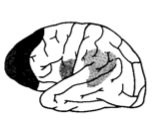
Injury to the black area causes what changes in language development?
|
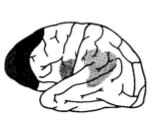
No shift in language
|
|
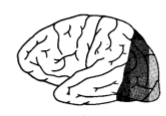
Injury to the black area causes what changes in language development?
|
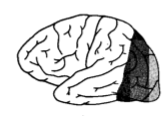
No shift in language
|
|
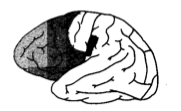
Injury to the black area causes what changes in language development?
|
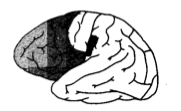
Shift of anterior speech functions
|
|
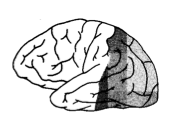
Injury to the black area causes what changes in language development?
|
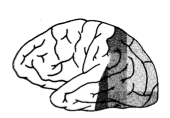
Shift of posterior speech functions
|
|
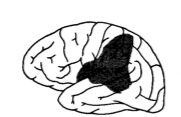
Injury to the black area causes what changes in language development?
|
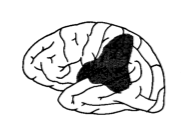
Complete shift of language
|
|
|
How do the two hemispheres or the cerebrum relate to each other?
|
- Not mirror images in morphology or function
- Organized differently in terms of how they perform secondary and tertiary level functions - Lateralization if relative and complementary, increases with age before puberty and decreases with age after |
|
|
What are the types of speech disorders?
|
- Mutism
- Aphonia - Aphemia - Dysarthria |
|
|
What is mutism? Cause?
|
- Absence of speech: organic or elective
- Lesion to supplementary motor area |
|
|
What is aphonia?
|
Loss of capacity to produce vocal sound
|
|
|
What is aphemia? Cause?
|
- AKA Anarthria, loss of capacity to verbalize
- Lesion near Broca's Area |
|
|
What is dysarthria? Cause?
|
- Impaired capacity to articulate speech sounds to to impaired neuromuscular control
- Alcohol |
|
|
What are the types of language disorders?
|
Aphasias - acquired disturbances of linguistic functions due to injury of the CNS
|
|
|
How can you assess the type of language disorder / aphasia?
|
- Fluency (spontaneous speech)
- Auditory comprehension - Repetition Speech |
|
|
What are you assessing when you listen for "fluency"?
|
- Phrase length (words per utterance: 1-2 short, >6-7 normal)
- Effortfulness - Prosody (melodic aspects of speech) - Grammatical form |
|
|
What are the types of syndromes associated with language?
|
- Global
- Isolation of speech - Broca's - Transcortical Motor - Wernicke's - Transcortical Sensory - Conduction - Nominal (Anomic, Amnesic) |
|
|
Global Language Syndrome:
- Fluency - Comprehension - Repetition |
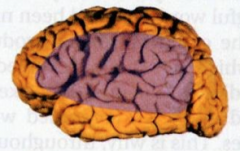
- Fluency: No
- Comprehension: No - Repetition: No |
|
|
Isolation of Speech Syndrome:
- Fluency - Comprehension - Repetition |
- Fluency: No
- Comprehension: No - Repetition: Yes |
|
|
Broca's Syndrome:
- Fluency - Comprehension - Repetition |
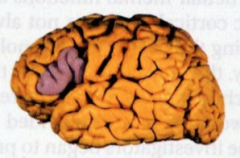
- Fluency: No
- Comprehension: Yes - Repetition: No |
|
|
Transcortical Motor Syndrome:
- Fluency - Comprehension - Repetition |
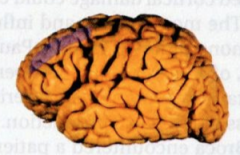
- Fluency: No
- Comprehension: Yes - Repetition: Yes |
|
|
Wernicke's Syndrome:
- Fluency - Comprehension - Repetition |
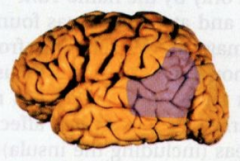
- Fluency: Yes, P (paraphasias present in speech)
- Comprehension: No - Repetition: No |
|
|
Transcortical Sensory Syndrome:
- Fluency - Comprehension - Repetition |
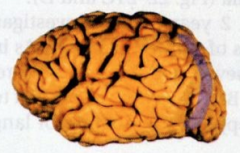
- Fluency: Yes, P (paraphasias present in speech)
- Comprehension: No - Repetition: Yes |
|
|
Conduction Syndrome:
- Fluency - Comprehension - Repetition |
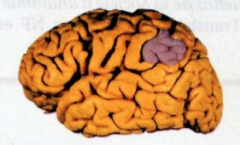
- Fluency: Yes, P (paraphasias present in speech)
- Comprehension: Yes - Repetition: No |
|
|
Nominal (Anomic, Amnesic):
- Fluency - Comprehension - Repetition |
- Fluency: Yes
- Comprehension: Yes - Repetition: Yes |
|
|
- Fluency: No
- Comprehension: No - Repetition: No What language syndrome? |
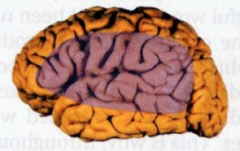
Global Language Syndrome
|
|
|
- Fluency: No
- Comprehension: No - Repetition: Yes What language syndrome? |
Isolation of Speech Syndrome
|
|
|
- Fluency: No
- Comprehension: Yes - Repetition: No What language syndrome? |
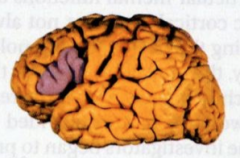
Broca's Syndrome
|
|
|
- Fluency: No
- Comprehension: Yes - Repetition: Yes What language syndrome? |
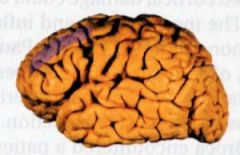
Transcortical Motor Syndrome
|
|
|
- Fluency: Yes
- Comprehension: No - Repetition: No What language syndrome? |
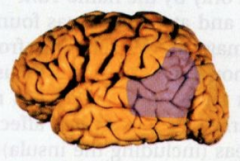
Wernicke's Syndrome
|
|
|
- Fluency: Yes
- Comprehension: No - Repetition: Yes What language syndrome? |
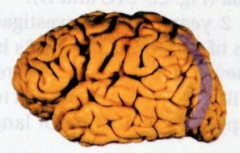
Transcortical Sensory Syndrome
|
|
|
- Fluency: Yes
- Comprehension: Yes - Repetition: No What language syndrome? |
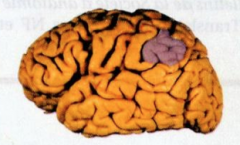
Conduction Syndrome
|
|
|
- Fluency: Yes
- Comprehension: Yes - Repetition: Yes What language syndrome? |
Nominal (Anomic, Amnesic)
|
|
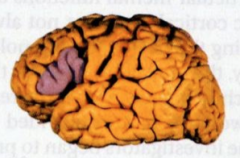
What language syndrome?
- Fluency - Comprehension - Repetition |
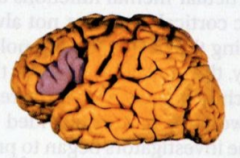
Broca's:
- Fluency: No - Comprehension: Yes - Repetition: No |
|
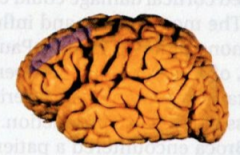
What language syndrome?
- Fluency - Comprehension - Repetition |
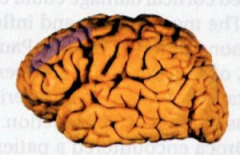
Transcortical Motor:
- Fluency: No - Comprehension: Yes - Repetition: Yes |
|
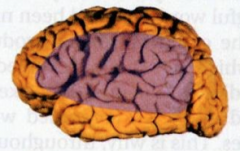
What language syndrome?
- Fluency - Comprehension - Repetition |
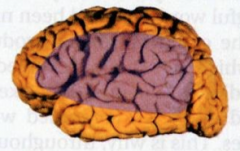
Global:
- Fluency: No - Comprehension: No - Repetition: No |
|
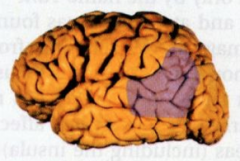
What language syndrome?
- Fluency - Comprehension - Repetition |
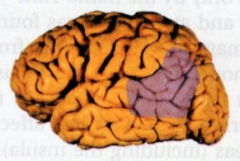
Wernicke's:
- Fluency: Yes - Comprehension: No - Repetition: No |
|
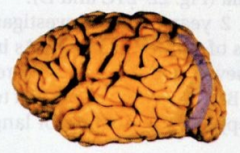
What language syndrome?
- Fluency - Comprehension - Repetition |
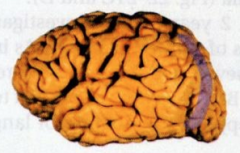
Transcortical Sensory:
- Fluency: Yes - Comprehension: No - Repetition: Yes |
|
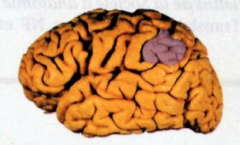
What language syndrome?
- Fluency - Comprehension - Repetition |
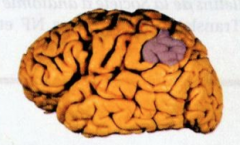
Conduction Syndrome:
- Fluency: Yes - Comprehension: Yes - Repetition: No |
|
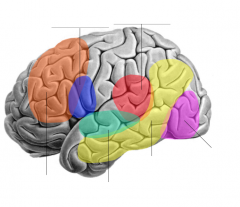
Orange Area/Function?
|
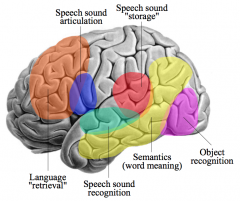
Orange - Language "retrieval" area
|
|
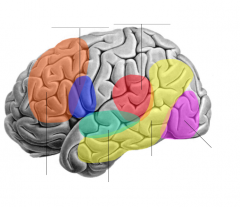
Blue Area/Function?
|
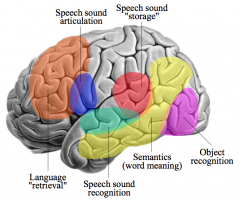
Blue - Speech Sound Articulation
|
|
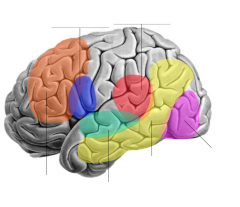
Green Area/Function?
|
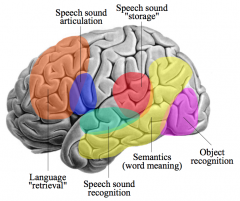
Green - Speech Sound Recognition
|
|
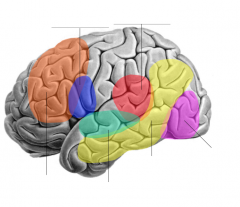
Red Area/Function?
|
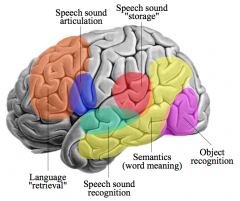
Red - Speech Sound "Storage"
|
|
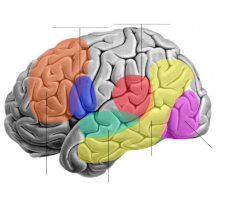
Yellow Area/Function?
|
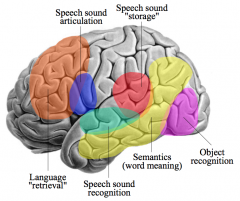
Yellow - Semantics (Word Meanings)
|
|
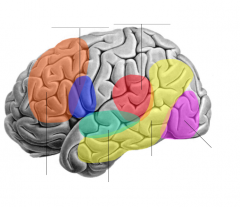
Purple Area/Function?
|
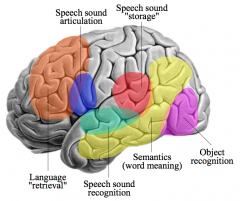
Purple - Object Recognition
|
|
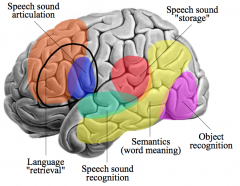
What language syndrome would occur if the black outlined area was lesioned?
|
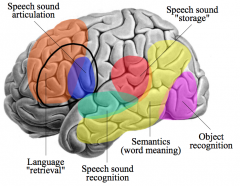
Broca's Aphasia:
- Fluency: No - Comprehension: Yes - Repetition: No |
|
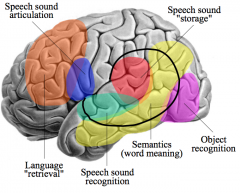
What language syndrome would occur if the black outlined area was lesioned?
|
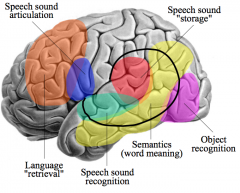
Wernicke's Aphasia:
- Fluency: Yes - Comprehension: No - Repetition: No |
|
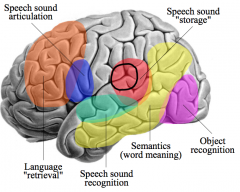
What language syndrome would occur if the black outlined area was lesioned?
|
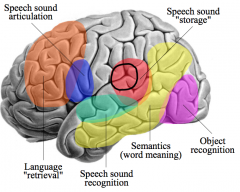
Conduction Aphasia:
- Fluency: Yes - Comprehension: Yes - Repetition: No |
|
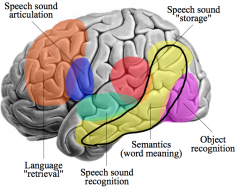
What language syndrome would occur if the black outlined area was lesioned?
|
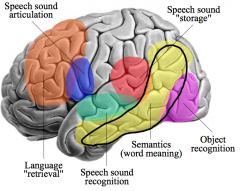
Transcortical Sensory Aphasia:
- Fluency: Yes - Comprehension: No - Repetition: Yes |
|
|
How deep are the lesions that cause the language disturbances?
|
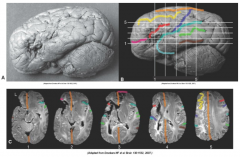
- Deeper than surface lesion
- Need to damage basal ganglia and internal capsule |

